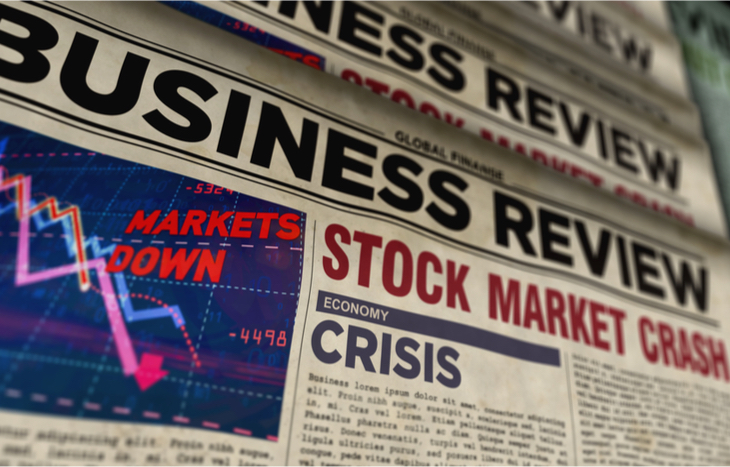Will the Stock Market Crash Again?

It’s been a brutal year for stocks, a possible warning of a stock market crash in 2022. For instance, the S&P 500 stock index is down just over 20%, and the Dow Jones Industrial Average is down 17% for the year. Tech stocks have been hit particularly hard. The tech-heavy Nasdaq stock index is down 31%, worse than the other indexes.
There are several contributing factors to the fall in stocks this year. First, 2020 and 2021 were great years for the U.S. economy and stocks. Growing the economy even further beyond those years in 2022 is a tough task.
Throughout the world, countries dealt with the COVID-19 pandemic in many ways. Some instituted strict lockdowns, and some did nothing. Unfortunately, some of the world’s leading suppliers were the strictest of lockdowns. The lockdowns rippled through the world’s supply chain that many companies are still feeling today. U.S. stocks did not respond well to the supply chain issues, either.
Just when we thought things couldn’t get any worse, Russia invaded Ukraine. In response to Russia’s actions, countries worldwide issued sanctions against the country. Those sanctions included bans on Russian oil and natural gas. Because Russia is one of the largest exporters of oil and natural gas, the price of those commodities shot up quickly.
These and other factors have led to record-high inflation. The oil and gas we use to run businesses, heat homes and fuel cars and trucks are at record highs. In addition, supply chain issues have caused things like cars to become scarce and more expensive. With all these things going on, there’s no wonder folks fear a stock market crash.

Stock Market Crash Predictions
Everyone wants to know if there will be a stock market crash in 2022 or any year for that matter. Let’s face it, though, no one knows for sure. Although it is impossible to predict the stock market’s next move, it is vital to consider the possibilities.
Instead of guessing where stocks will be in the near future, it might be helpful to take a look at what is causing stocks to fall. For instance, the conflict between Russia and Ukraine has caused oil and gas price inflation. The higher prices have increased the cost of the gas we put in our cars and the cost to heat our homes. Will quick resolution between the two countries make prices retreat?
Maybe. Lower commodity prices may be determined by how countries deal with their sanctions against Russia. If they lift the sanctions right away and begin buying Russian oil and gas, supply may return to normal levels, and prices should follow. If not, prices could remain high.
The worldwide supply chain is another issue. Much of the issue can be traced to strict COVID-19 shutdowns. Countries like China have shut down businesses to contain the virus. Most recently, the Omicron strain led to shutdowns in China. China is one of the largest exporters in the world. Without those supplies, countries that rely on Chinese goods cannot meet demand.
Though China and other exporting countries have begun to lift shutdown orders, it will take time for the global supply chain to catch up.
Will the Stock Market Crash?
Before we ask if the stock market will crash, it might be helpful to know exactly what a stock market crash is. One definition says: A stock market crash is a rapid and often unanticipated drop in stock prices. A stock market crash can be a side effect of a major catastrophic event, economic crisis, or the collapse of a long-term speculative bubble. Reactionary public panic about a stock market crash can also be a major contributor to it, inducing panic selling that depresses prices even further.
A stock market crash is a bit different from a bear market. One definition of a bear market says: A bear market is when the overall stock market drops by 20% or more from its recent highs. Other definitions of bear markets are similar but say that a stock market index needs to close a trading session below 20%.
Currently, the Nasdaq stock index is in a bear market. The S&P 500 index reached the negative 20% mark earlier in 2022 and again on June 13. Though the Dow Jones Industrial Average is down for the year, it has not yet reached the 20% level.
The definition of a stock market crash is a bit murkier. For instance, to meet the definition, stocks must drop rapidly and be unanticipated. Stocks have fallen, but not necessarily rapidly. In addition, supply chain issues and commodity price spikes were not necessarily unanticipated. Although, you could say those events meet other definitions like a major catastrophic event or economic crisis.
Will the stock market recover? There have been many stock market crashes throughout history. Each time the market has recovered. Because we don’t know if there will be a stock market crash or how bad it could get, averaging down may be a good long-term strategy.
Stock Market Crash in 2022
Over the last several decades, the stock market went through the Black Monday Crash of 1987 and the dot com bubble in 2000. To understand a stock market crash in 2022, we must understand other stock market crashes. Here’s a look at each one.
- On Monday, October 19, 1987, stock markets crashed more than 20% in one day. The crash was short but very steep. In hindsight, the crash was brought on by program trading. Computers were becoming a new way to conduct business at the time, and traders had recently begun creating computer programs to trade stocks, one popular trading program was Portfolio Insurance. Portfolio Insurance was a strategy designed to sell stocks as they fell below certain price targets. The preceding Friday was a particularly poor day for stocks. When the market opened on Black Monday, the program traders flooded the market with more sell orders than it could handle.
- The nineties were a great time for the U.S. economy and stocks. In addition, the personal computer has sparked the interest of everyone. Investors’ interest was especially piqued because everyone was using the internet on computers. Investors were no exception. It seemed like every internet-related stock was skyrocketing. The speculation became so crazy that companies without sales or profits would IPO. There are even stories of companies simply adding ‘.com’ to the end of their name. Eventually, the economy slowed in 2000 and 2001, and the music stopped. The Nasdaq lost 77% of its value by 2002.






